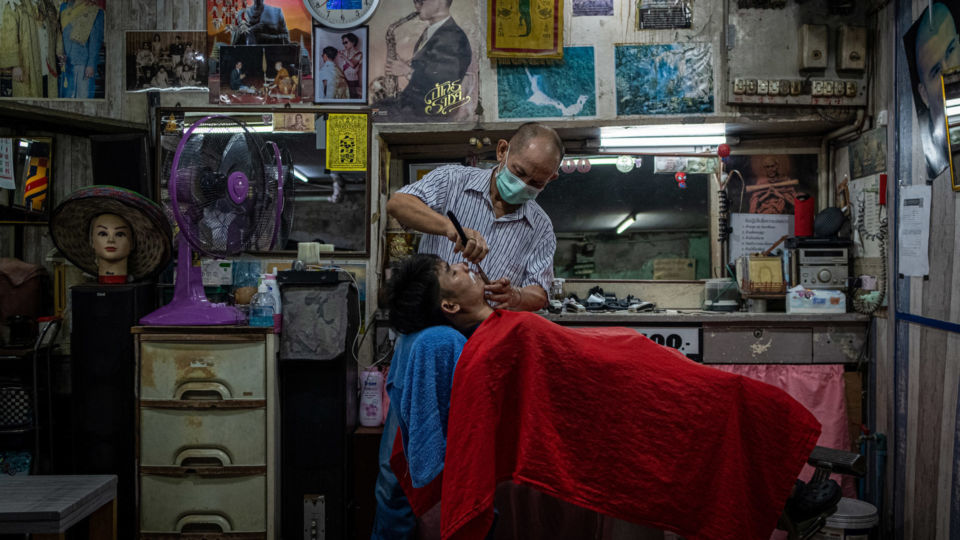All photographs Neil Shelley
A meter-thick concrete strut looms close overhead. Durian vapors stain the air as a nearby seller thwock-thwocks a machete into their vicious guts. Thick afternoon humidity foretells a sweaty storm that will lash the city all night, and I am pinned to a chair under a bridge.
Not just any bridge but a bridge I’ve long passed beneath to slingshot back into cosmopolitan Bangkok rather than cross the Phra Khanong canal into the outlands of On Nut and beyond.
Beneath this bridge are many barbers. Relics ripped from another era along with their antique vinyl chairs, faded mementos, copious pomade, and decades of accumulated hair. Oh, the hair.
Today, years of personal curiosity are climaxing in dissonant thoughts: This is either the best haircut I have had in years, or it is the worst.
“Jai yen, yen,” soothes the barber shearing me with unnerving speed. “Jai yen, yen.”
Does he also read minds? No, but he can read faces, and a glance at his grimy mirror confirms mine is in full grimace. I may end up resembling one of the Stooges. Not Iggy, but Moe.
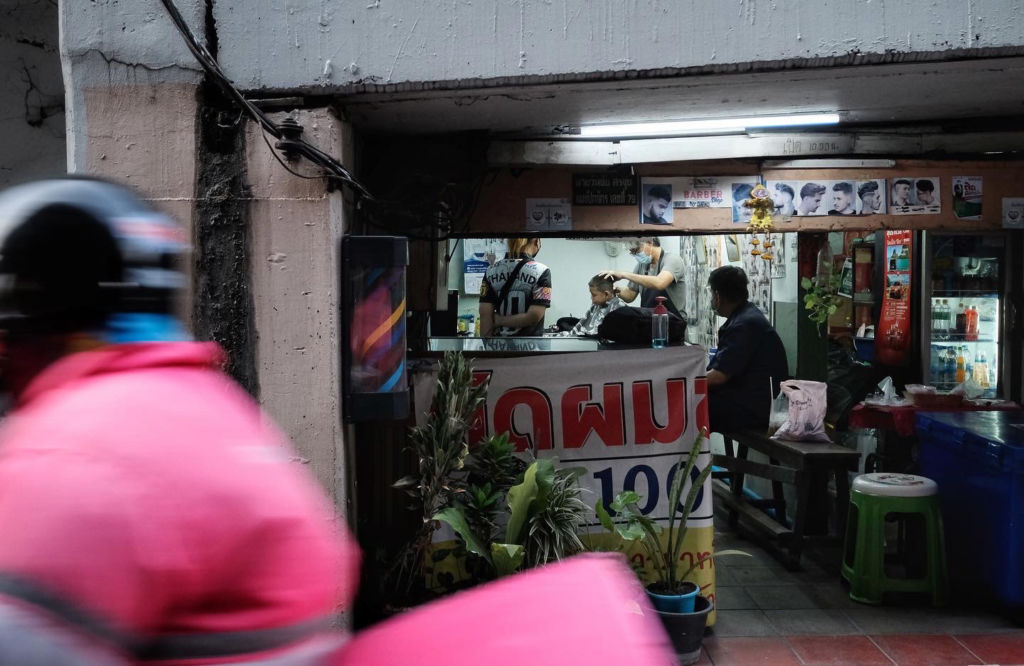
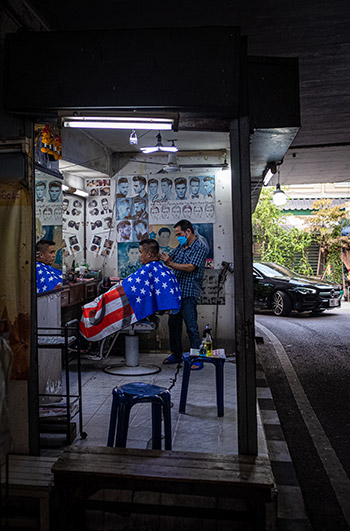
In all my Bangkok years, I have never had a truly satisfactory haircut. Visiting my longtime stylist back in Los Angeles – where we smugly call them stylists – became the centerpiece of my annual pilgrimages home.
It took years to work up the courage to head under the bridge to where a dozen or so graying men are all that remain of a time Phra Khanong was the go-to weekend destination for families and couples from across Bangkok.
Today, the warren of shabby stalls and 15-or-so barber booths is called Singha Market. Three decades and more ago, it was known as Kalabok Market, kalabok being an older-timey word for barber.
I set aside my classist assumptions and air-conditioned comfort for a sweaty spot steps from careening cars after hearing a series of unsolicited testimonials.
“I went under the bridge to the dirtiest hair place ever. There’s like hair on the ground, everywhere, like back pushed in the corners, kind of like fur,” local man Adam Leigh told me. “You know, it was really gross, but the guy looks super dapper. Shaved and did a haircut and a massage for 100 baht. Best haircut, cheapest haircut I’ve even gotten. I will only go there.”
“There” is the Phra Khanong pier, which in the 1990s was the disembarkation point for families arriving by boat from across the capital. Phra Khanong was the warm, happy center of cosmopolitan Bangkok life. People poured in for its market, department store, retailers, and multiple movie theaters.
Everyone came. At least until Bangkok’s mega indoor shopping malls opened to bleed the vitality of the streets-in-between. And the first stop for many hopping off the boats under the bridge was a shave and a haircut.
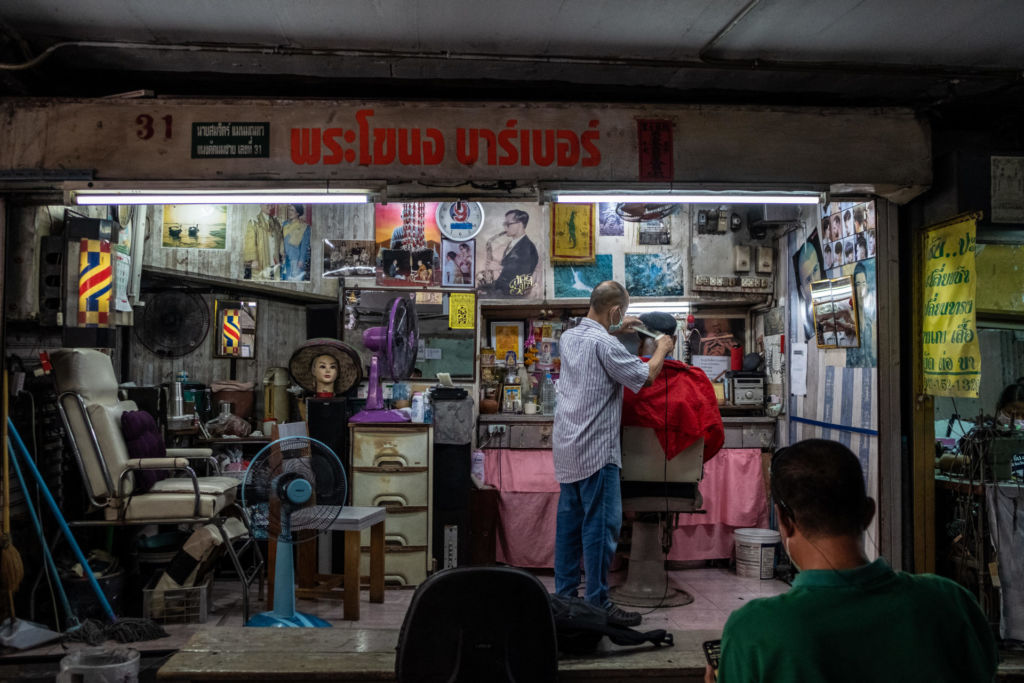
“Back in the day, Phra Khanong was so lively,” said 53-year-old barber Banphot “Kaew” Issarawuthakul. “Phra Khanong used to never sleep. Like around 7pm to 10pm, you would still see large amounts of people walking around here. There was loud music all night.”
It was so busy then that three barbers crowded into the stalls which today house only one.
For my cut, I chose the barber most visible when whisking around the U-turn: Lao Jongkammun, a 47-year-old veteran barber with a rockabilly aesthetic and fast smile.
“We get customers every day, even more so during weekends,” he said of his week’s rhythm. “On weekdays, people usually come here in the morning, and then the evening after work.”
Lao and the others have stuck around for the past 20 years. He starts every day at 8:30am and cuts hair until about 7:30pm. He does this every day. No days off. (“Customers used to line up until 9pm!” he mused.)
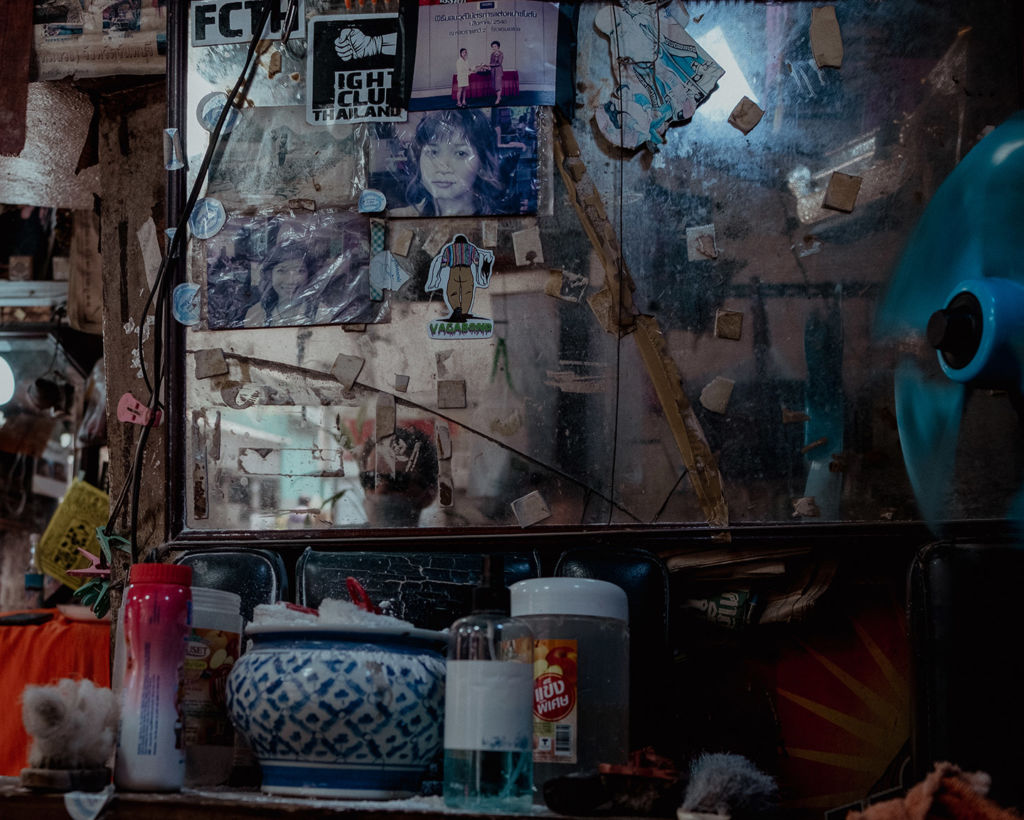
Lao is from Chiang Mai. When he came to Bangkok, he sold chicken in Khlong Toei’s sprawling wet market. He took a job apprenticing to a bridge barber around the time bird flu was ravaging Thailand in the noughties. Trained with him four years. A photo of his mentor, Boonterm “Singha” Wongpanya – the first barber for whom the market was later renamed – is plastered to his grungy mirror.
When Singha retired, Lao thought of opening a salon at home.
“My ajarn said, ‘No, just take my shop.” And that’s where he is cutting my hair today.
Leigh was right about the hair. The first thing I noticed on arriving was that the black moss clinging to every surface was actually a thick mat of black hair that’s fused with time into an astroturf-like covering.
Lao’s stall contains two antique and decrepit barber chairs now only used to hold a rotting board that acts as a makeshift shelf for his tonics and pomades. Atop the other one, hair clips are perched atop an old apple box, likely from the nearby fresh market.
In a city that has desperately picked at all its old scabs to clear out street vendors, shutter night markets, evict informal communities, and otherwise turn the page on its more-raucous past, it seems unlikely that this scene still exists. Surely the neat people in City Hall must want them gone?
For once, the barbers’ story does not involve being hounded by the city. In fact, they say the Bangkok Metropolitan Administration has been very supportive.
“The government takes care of us older generation,” Lao said.
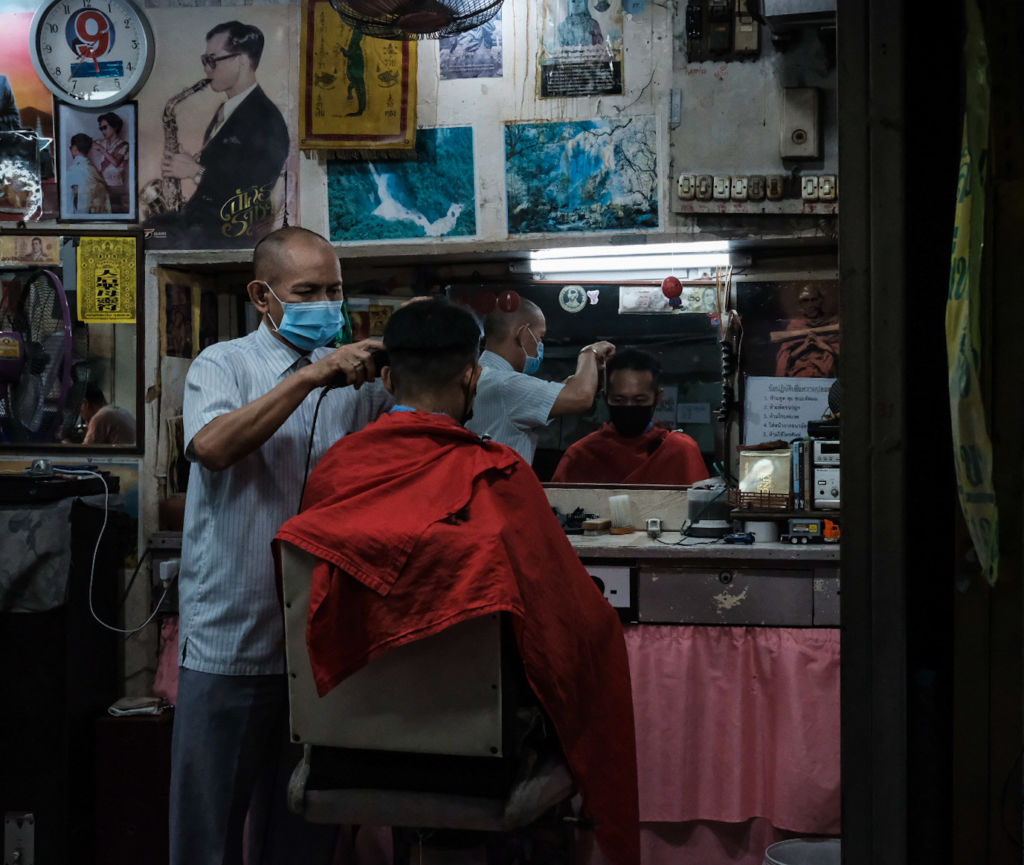
They pay rent to the city to occupy what is public land, though it has risen from THB650 to THB1,950. They hold three-year contracts, but there is no guarantee of renewal.
When COVID hit and everyone had to grow their hair out because the salons were closed, donations kept the Singha Market barbers afloat.
Why not find a less decrepit setting to ply their trade?
Leechai “Joe” Kruethong, who says he’s cut the hair of tourists, international students, foreigners, filmmakers, and more under the bridge for over 30 years, said he wouldn’t be happy anywhere else.
“I don’t want to move because I would have to start over with the business,” the 54-year-old barber said. “I would have to find new customers if I relocated. I can survive and live here.”
All those interviewed said that they get along.
Kaew, a relative newcomer who opened his shop about three years ago, said he’s lived in the area since he was born in the late ‘60s.
He said their occasional disputes “never get out of hand.”
“For example, if there is talk about prices, that really isn’t much of a problem, because we usually raise rates together. For example, two years ago, it cost 80 baht. We talked to each other about raising it to 100 baht to avoid any disagreements.”
“The people who have been here for a long time look after each other,” he added.
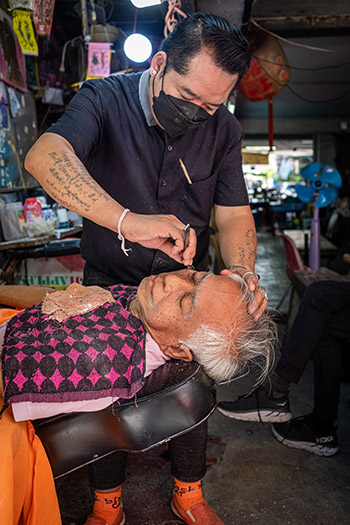
He took over the shop from a friend who used the stall to sell “sharp scissors.”
He says foreigners living in the community are more than welcome.
“I know everyone. If you want to go to any shop here, I can introduce you to them,” he said with a laugh.
He notes the recent developments but isn’t convinced Phra Khanong can fully return to its glory days. And he’s OK with that.
“It will be difficult to see this area come back like it used to be,” he said. “We have to accept the inevitable. But these shops will be around as long as there is the Phra Khanong bridge. I don’t think we will be going anytime soon.”
I relaxed from my grimace and settled into the familiar rhythm as Lao sheared my overgrown locks. The apogee of the experience was when he asked if I wanted a shave.
I consented. Rather than foam, he dusted my cheeks with powder and then proceeded to give me the most thorough razoring of my life. Nothing was spared. He even ran the bare blade over my upper eyelids. Siow.
There was some arm-squeezing massage action followed by some object abruptly and unexpectedly thrust into my ears and whisked around.
I paid the THB100 and made an appraisal.
Best damn cut in years.
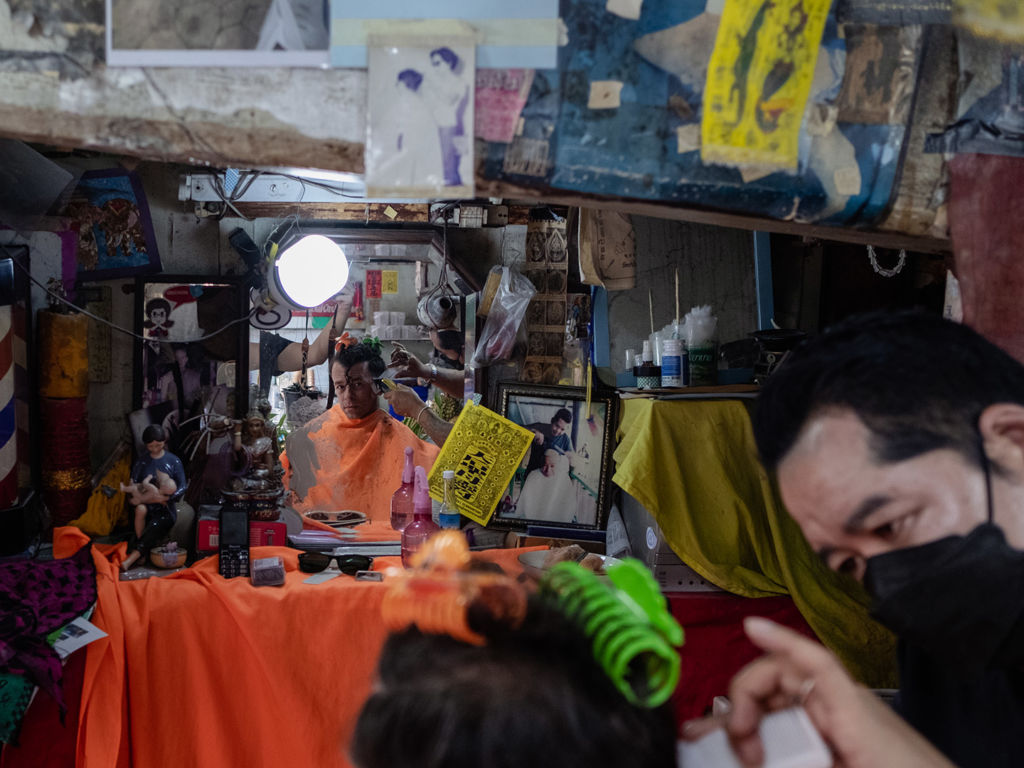
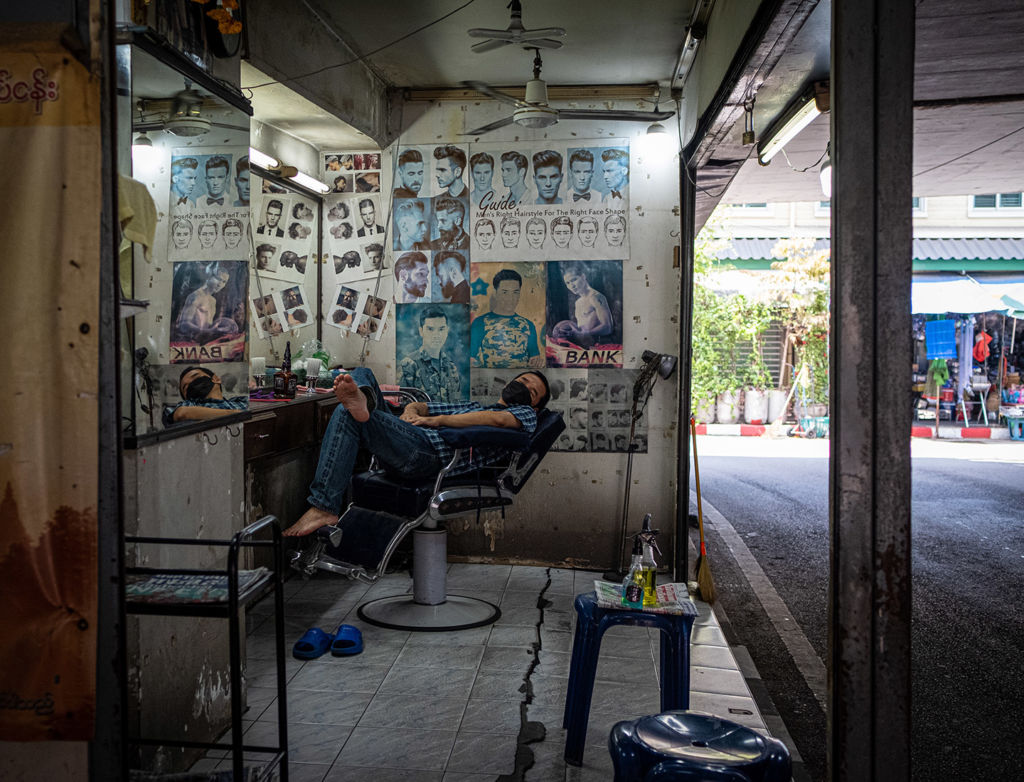
Additional writing and reporting Nicky Tanskul
